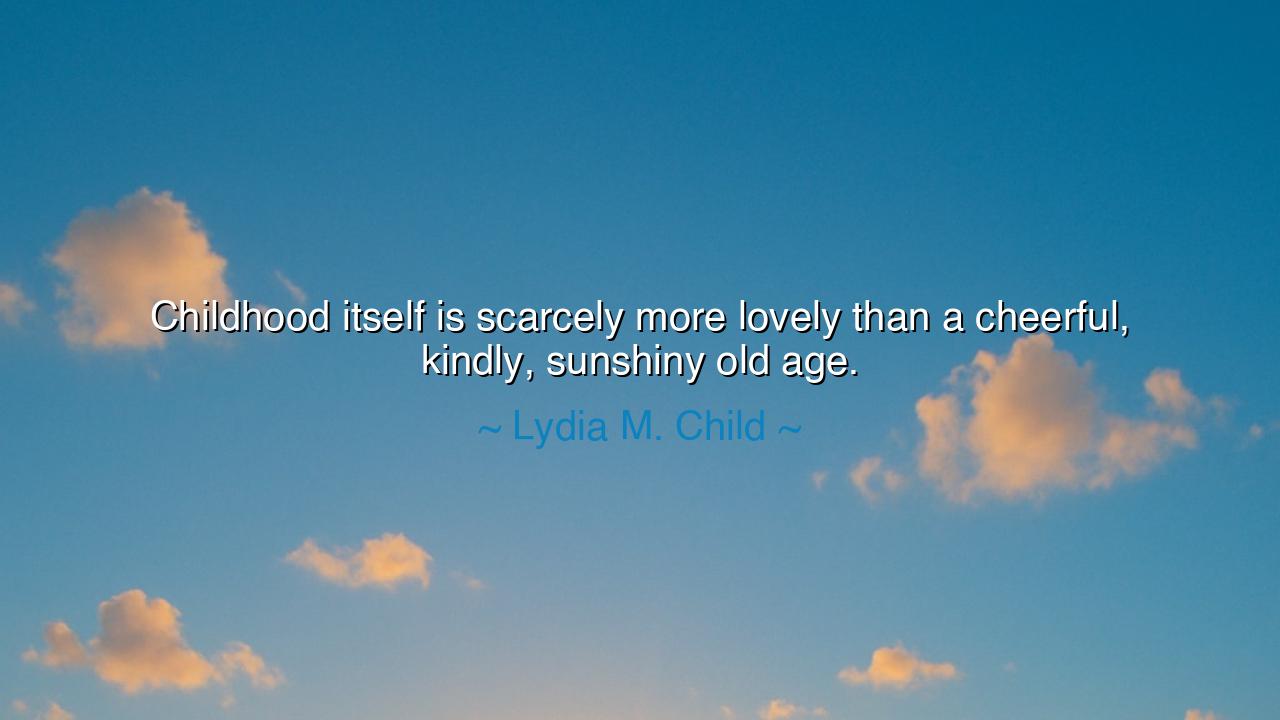
Childhood itself is scarcely more lovely than a cheerful, kindly






"Childhood itself is scarcely more lovely than a cheerful, kindly, sunshiny old age." These words, spoken by Lydia M. Child, carry with them a profound understanding of the cycle of life—a cycle that is often overlooked, especially when we view old age with sorrow or fear. Childhood, with its innocence, vitality, and boundless joy, is celebrated as one of the most beautiful stages of life. Yet Child reminds us that old age, too, can be equally, if not more, beautiful—when it is lived with cheerfulness, kindness, and a sunshiny spirit. This quote invites us to see that aging is not the decline of beauty or vitality, but an opportunity to embody a different, yet equally precious, form of grace and joy.
In the ancient world, old age was often regarded with reverence. The Greeks and Romans believed that wisdom, garnered over many years of living and learning, was one of the highest virtues. In Homer's Odyssey, the elderly were often depicted as guides—wise, patient, and calm. They had lived through countless trials and were the keepers of knowledge, resilience, and strength. The idea of aging was not seen as something to fear but as a natural transition that brought deeper insight into the ways of the world. The sunny nature of old age, as Child describes, was possible when the elderly accepted their role in society, not as burdens but as cherished members who radiated warmth and light for others to enjoy.
Consider the story of Socrates, that ancient philosopher whose life was filled with the pursuit of truth and wisdom. Though Socrates was not physically imposing in his later years, his cheerfulness and kindness remained ever-present. His wisdom, gained over decades of questioning and learning, shone brightly, bringing warmth and clarity to the younger generation. Socrates' attitude toward old age was one of embracing it with dignity, humility, and joy, choosing not to focus on the frailty of the body but on the vitality of the mind. His spirit embodied the sunshiny nature of aging that Lydia Child so beautifully describes—an old age that radiates light and positivity, sharing wisdom freely and joyfully with others.
As Lydia Child suggests, the beauty of old age is found in the attitude one adopts in later years. Cheerfulness and kindness—these are the qualities that elevate old age to something lovely. Imagine an elder who, with grace and good humor, offers a kind word to a stranger, who shares the joy of living with those around them, no matter their age. This is the sunny nature of old age—one that shines with a spirit unbowed by time. In the same way that childhood is often filled with wonder, curiosity, and lightheartedness, old age, when embraced with joy and wisdom, can possess a similar charm—a beauty that transcends the physical and touches the soul.
Let us consider Leonardo da Vinci, a man whose genius did not fade with the passage of time. Even in his later years, da Vinci maintained a cheerful, optimistic outlook, driven by a continual thirst for knowledge and creativity. While his body may have slowed with age, his mind never ceased to pursue innovation and discovery. His attitude toward aging reflected the very spirit that Lydia Child speaks of—one of relentless enthusiasm, joy in learning, and the willingness to share one’s wisdom with the world. Da Vinci’s life was a testament to the idea that old age, when embraced with a positive attitude, can be just as fulfilling as the youthful years—if not more so, as the elder has the privilege of drawing upon a life of experience, learning, and reflection.
As we reflect on Lydia Child’s words, we must ask ourselves: how will we choose to age? The joy and radiance of childhood are not lost with time, for they can be reclaimed in old age, if we approach life with the same openness, kindness, and cheerfulness that we once did as children. The challenge of aging gracefully is not one of maintaining physical beauty, but of cultivating a joyful spirit that continues to give, to love, and to share with those around us. The attitude of an elder, filled with warmth and a sunny disposition, becomes a beacon of hope, not just for their own lives but for the generations that follow.
O children of wisdom, take this lesson to heart: old age does not have to be filled with bitterness or regret, for it is an opportunity to embody the grace, joy, and light that we carry in our youth. Let us embrace aging with the same enthusiasm, curiosity, and vitality that we did when we were young. As you journey through life, let your soul shine brighter as you grow older, just as the sun shines ever warmer as it rises and sets. In this way, you will not only age gracefully, but also inspire those around you to live their own lives with the same love, kindness, and joy that transcend the years.






AAdministratorAdministrator
Welcome, honored guests. Please leave a comment, we will respond soon